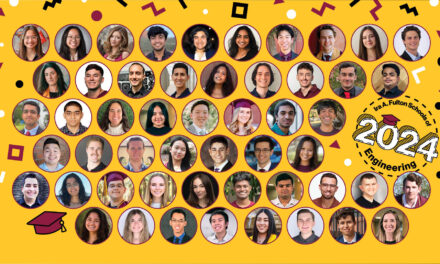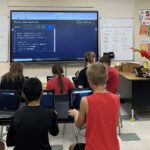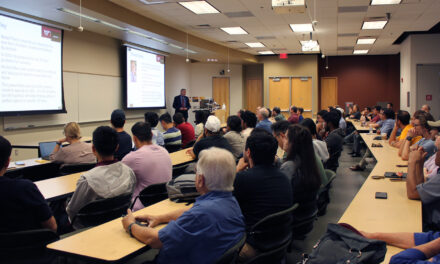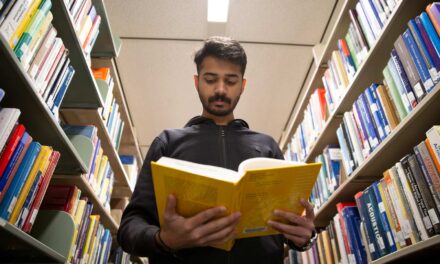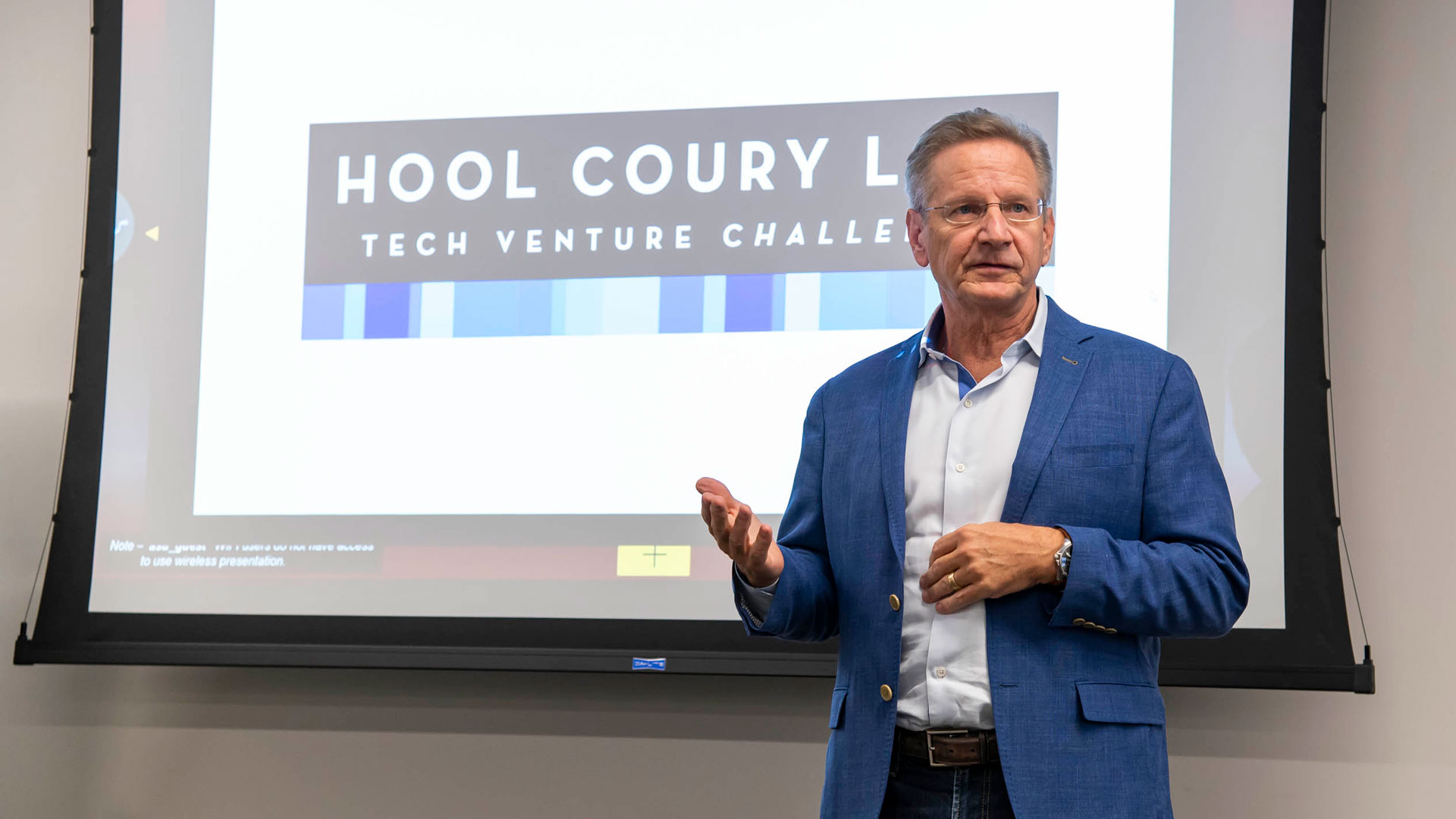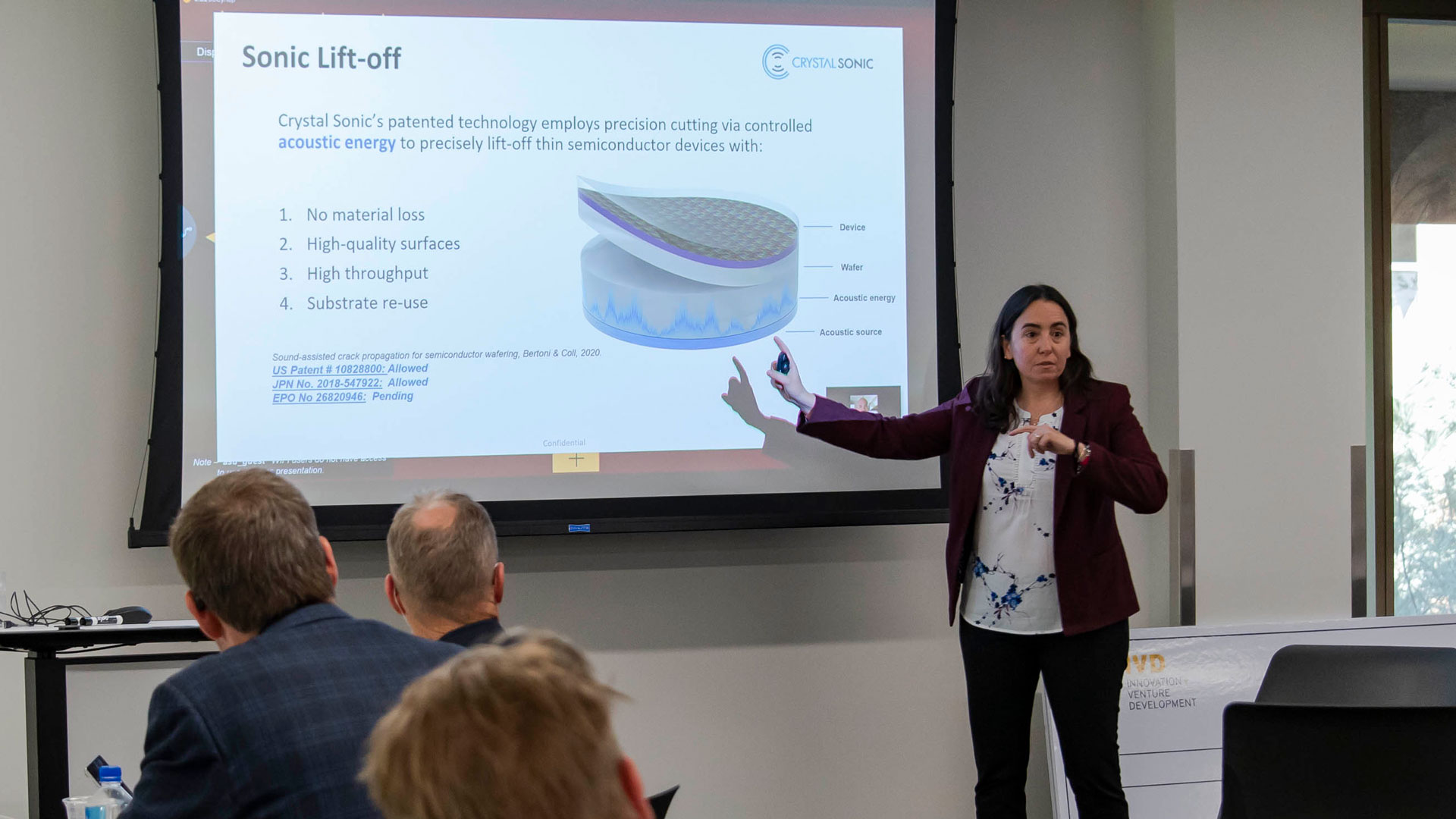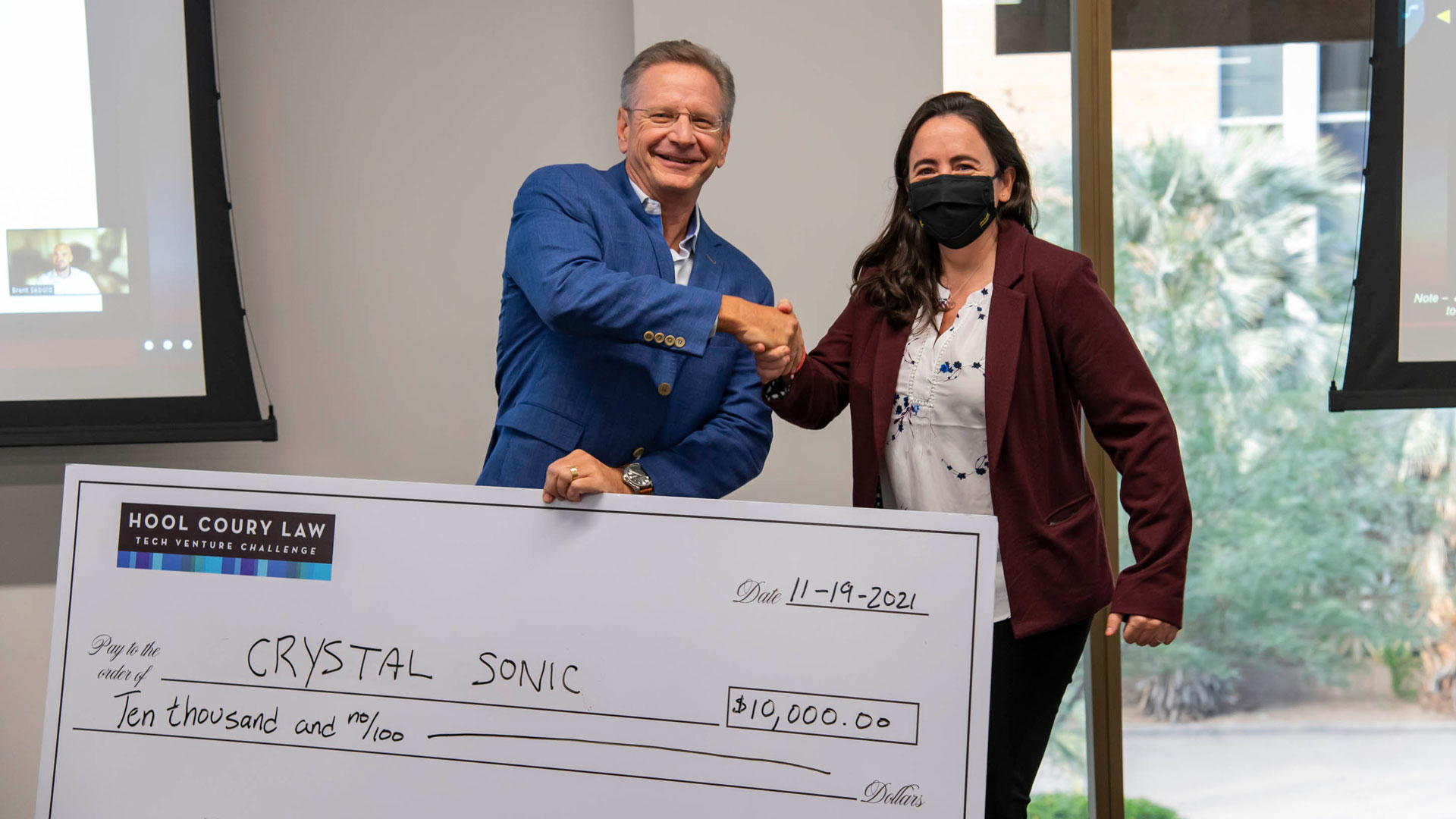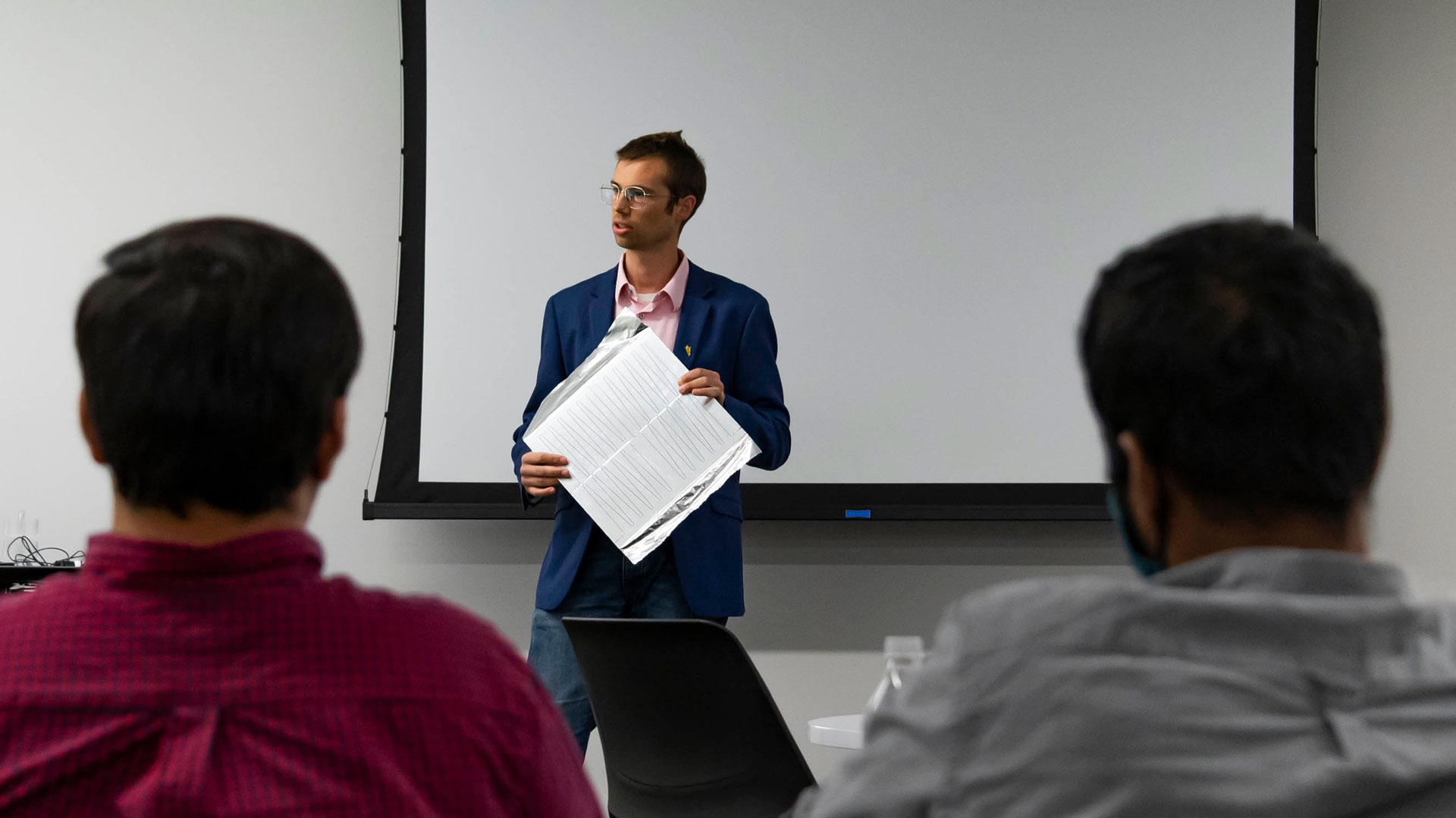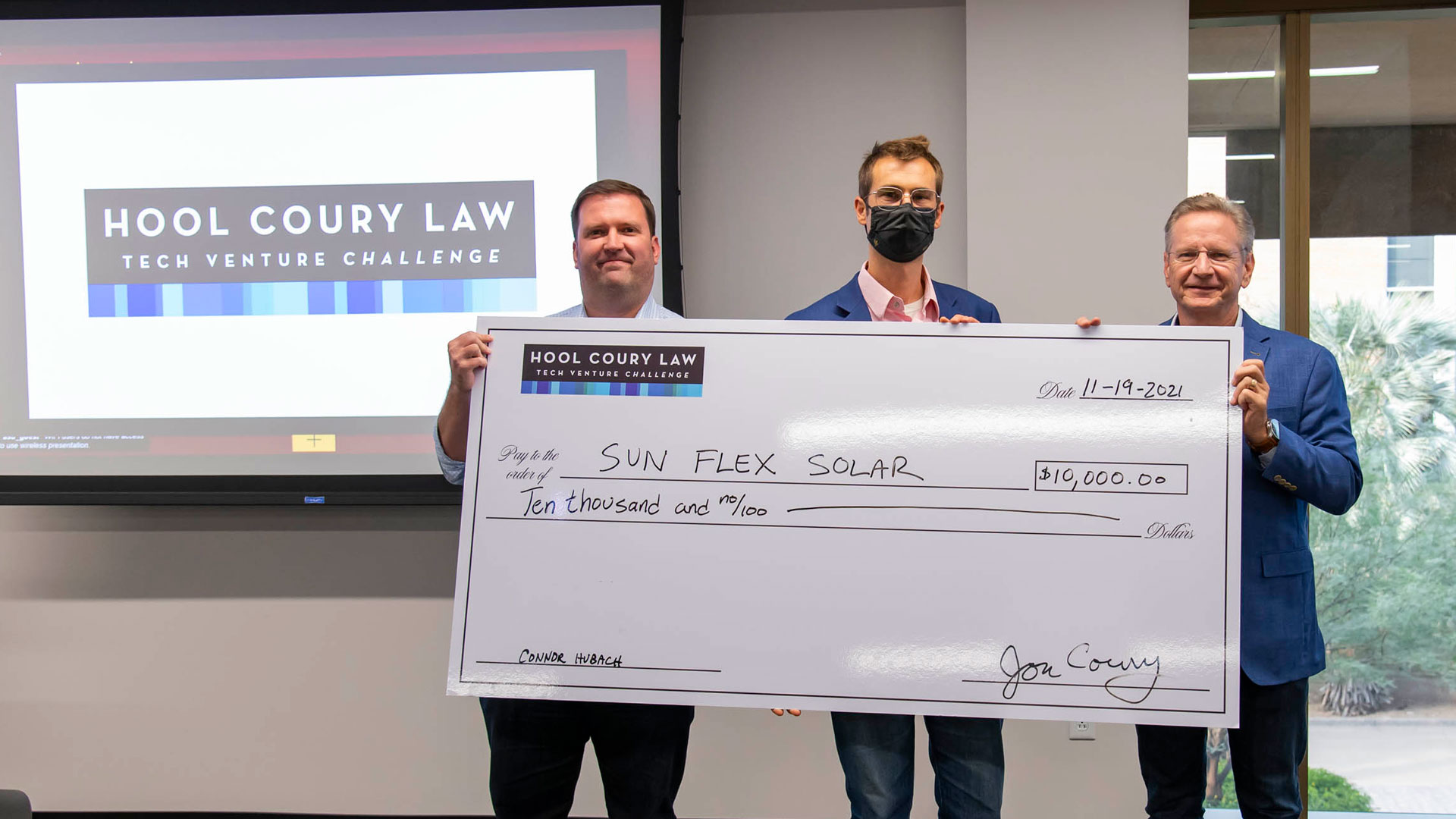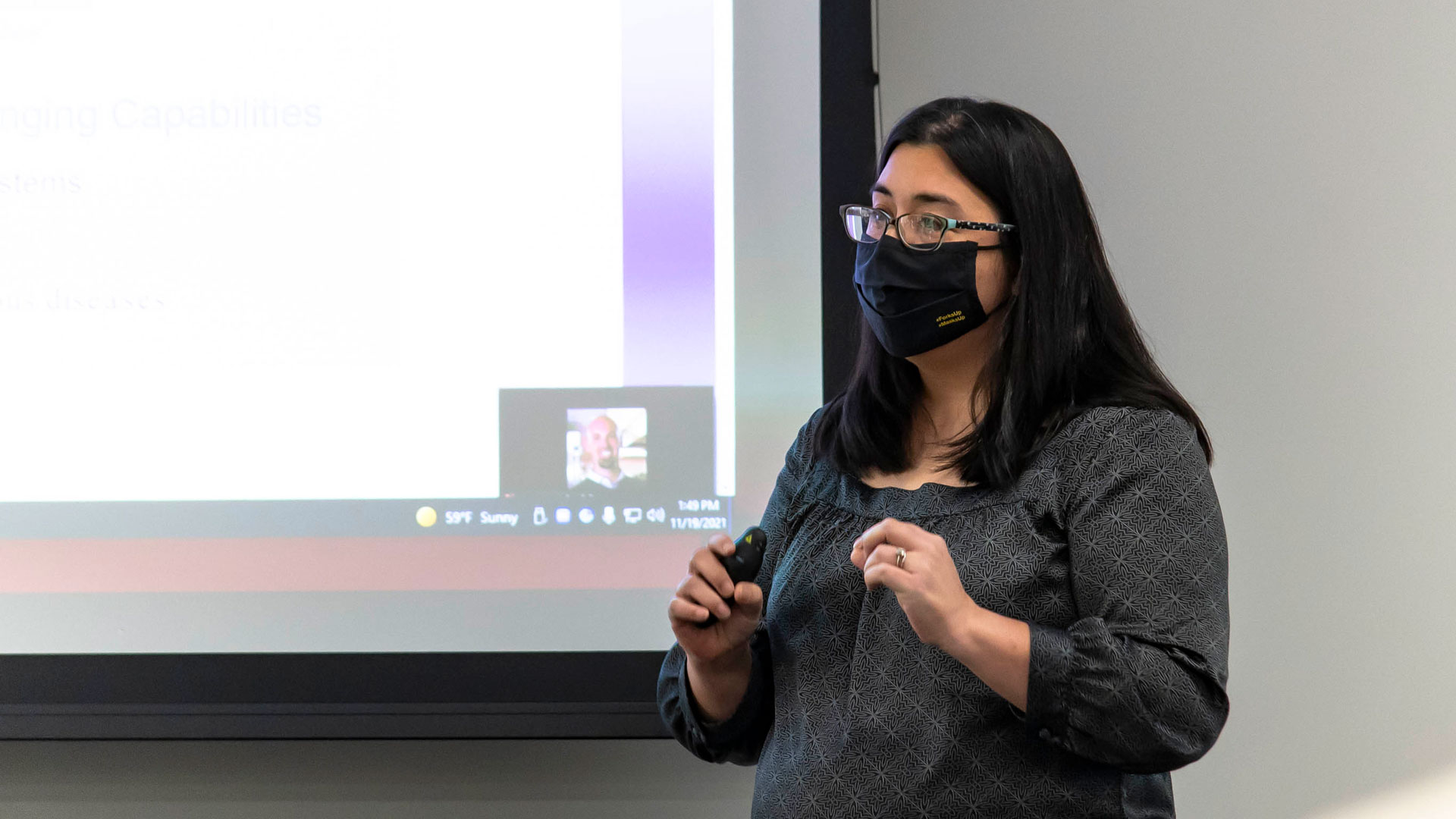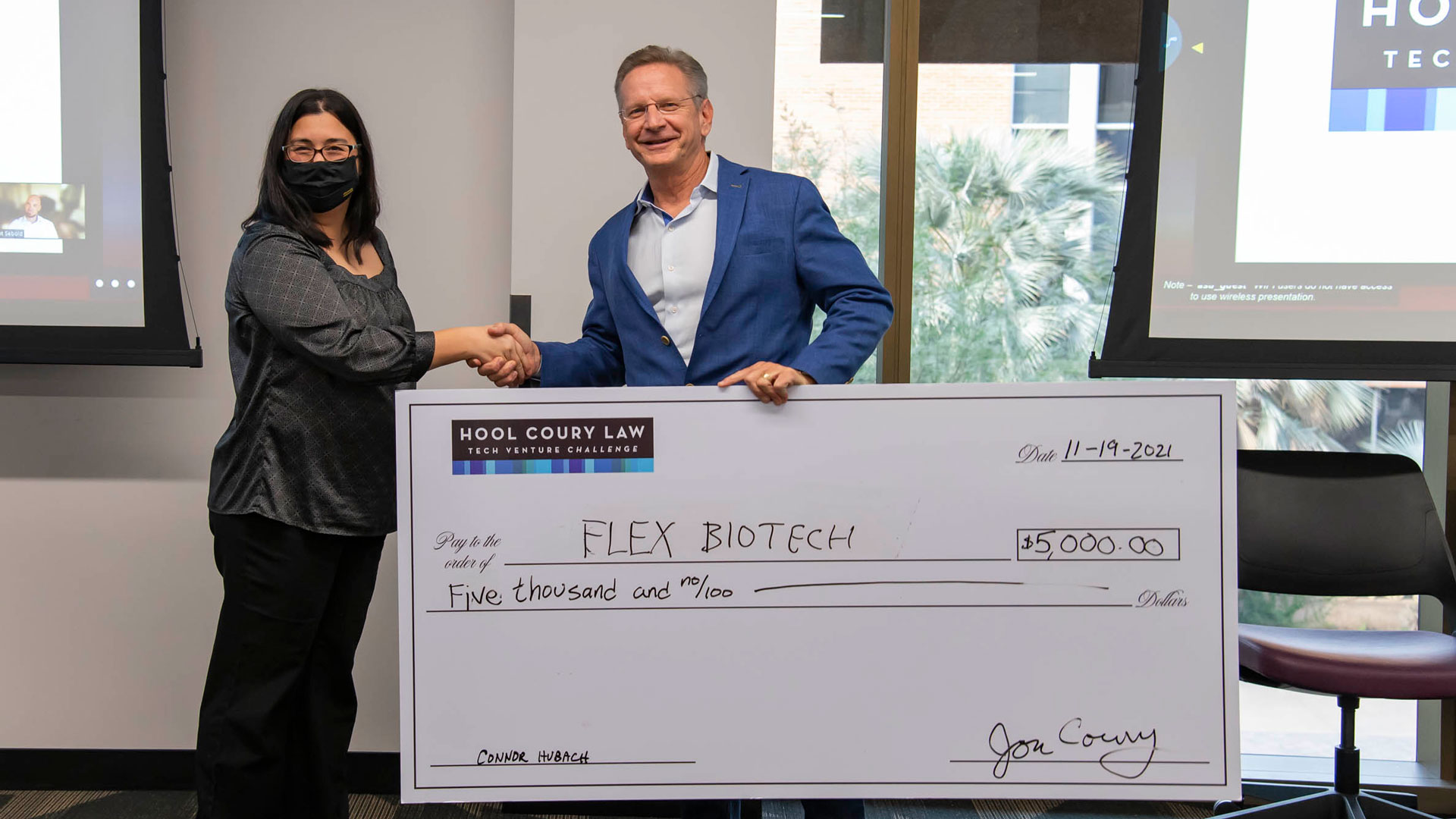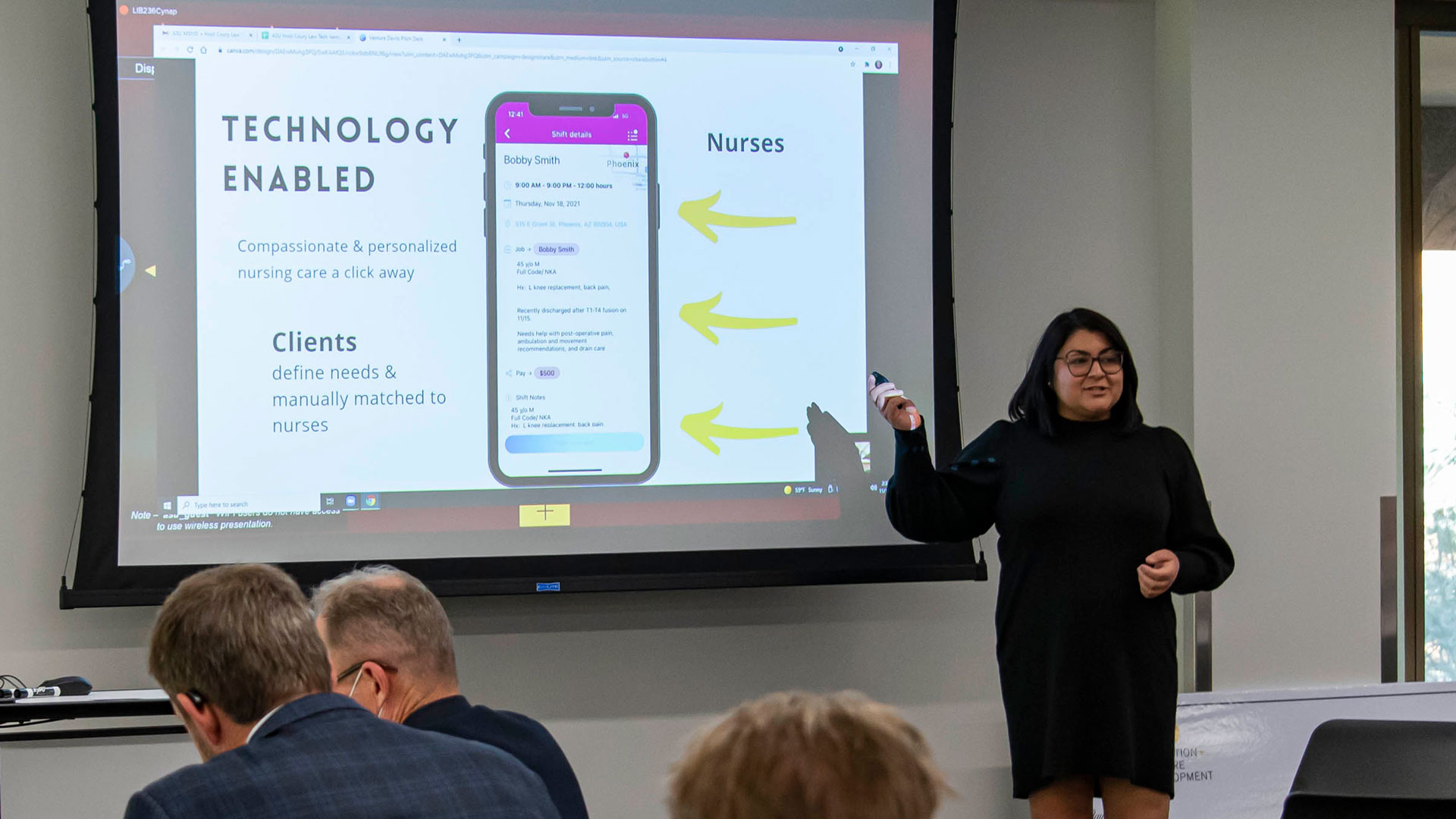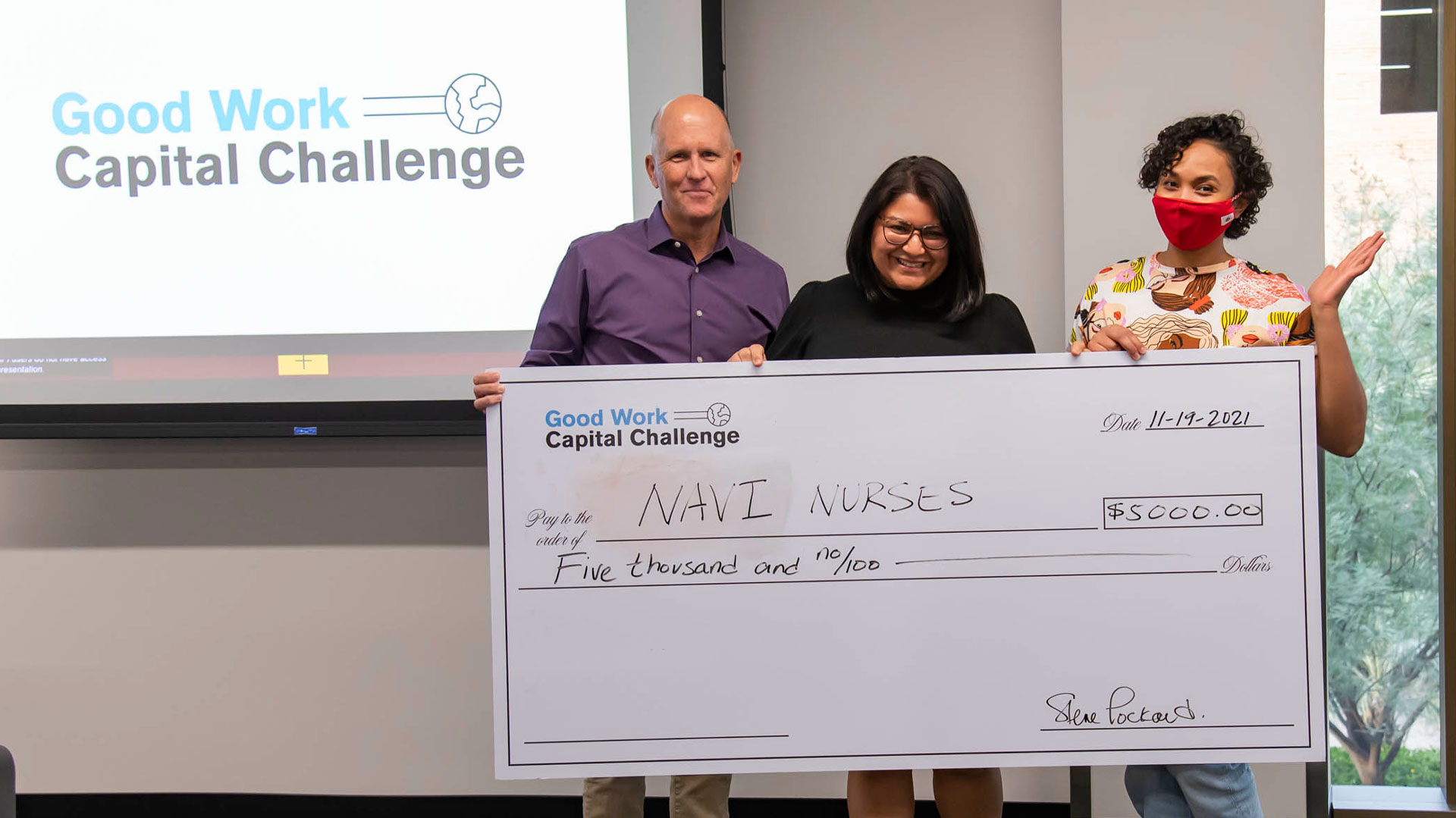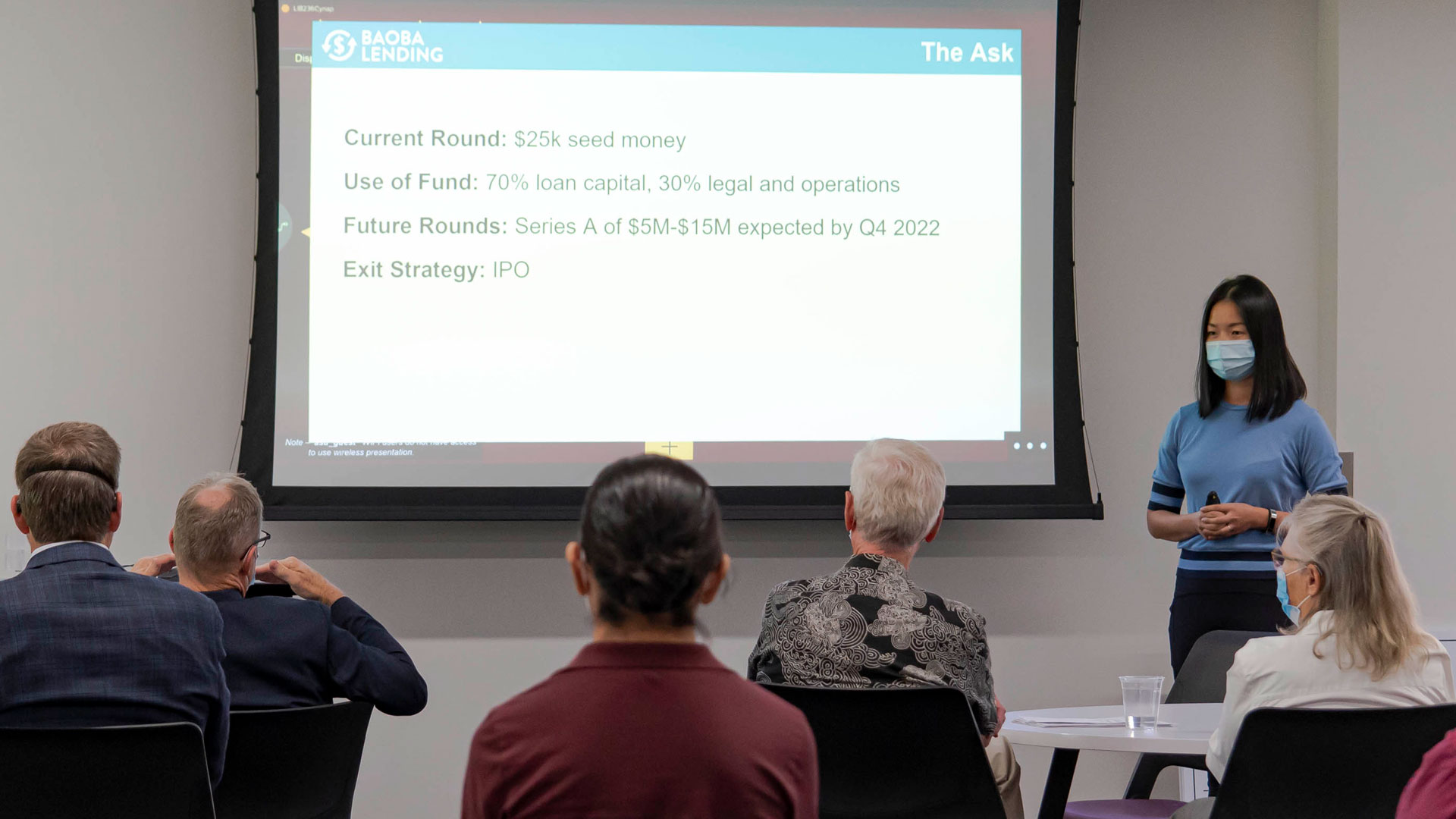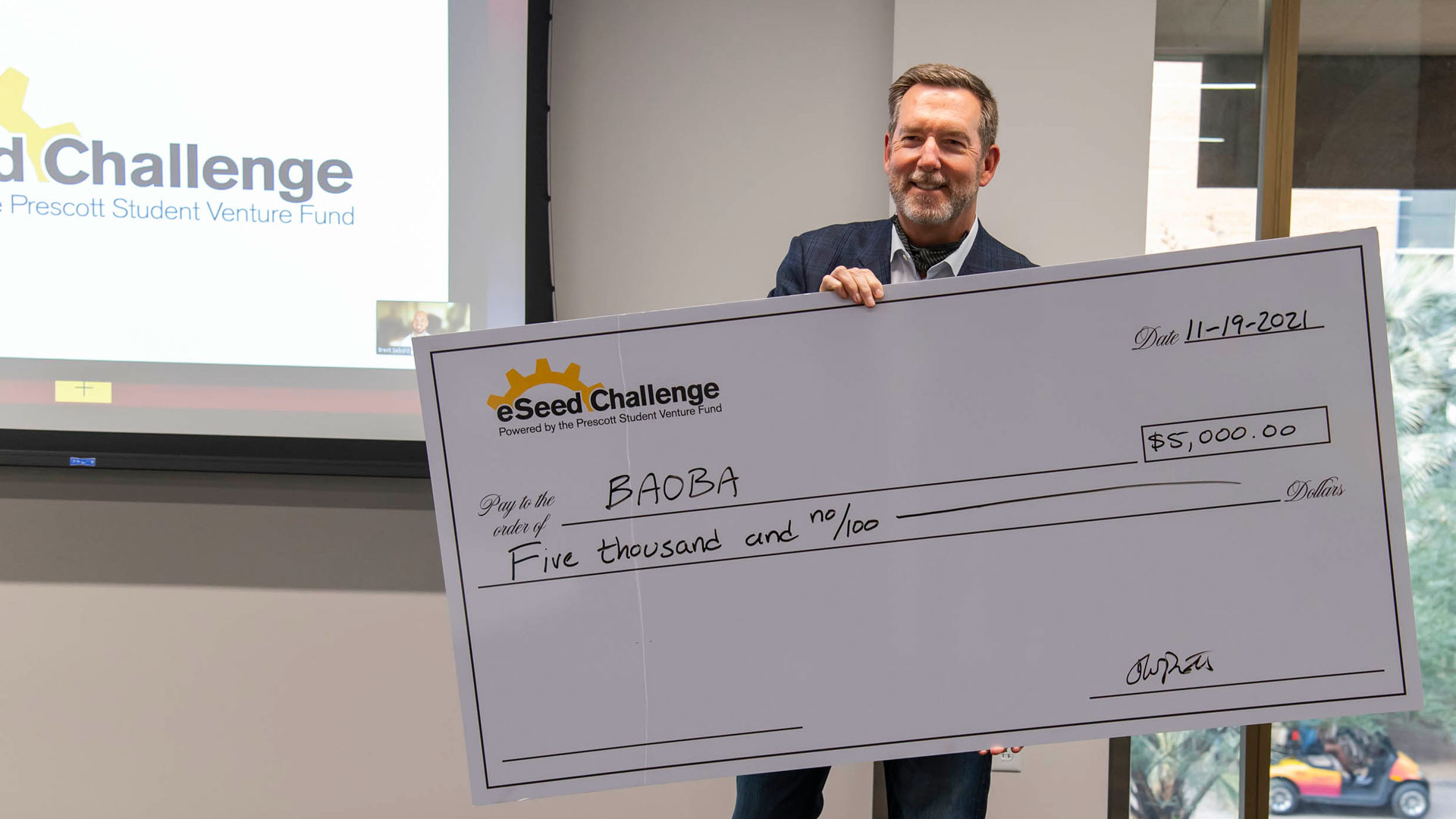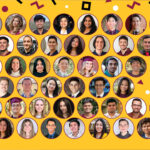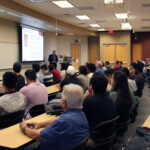
Passionate problem-solvers pitch for prizes
Faculty and student ventures earn funding and feedback at ASU Hool Coury Law Tech Venture Challenge
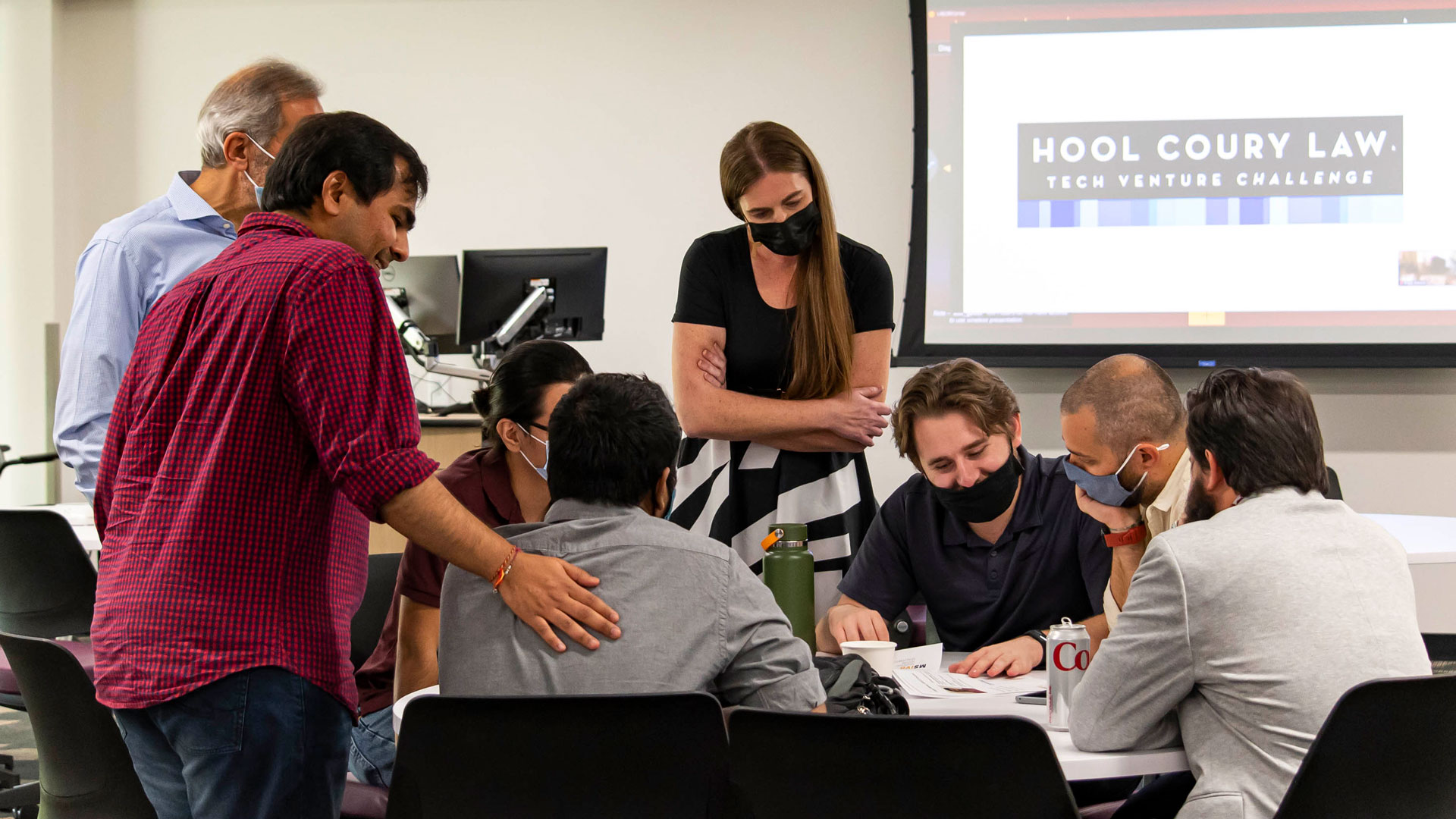
Above: Student entrepreneurs showed off their innovative ideas alongside experienced entrepreneurs from the Ira A. Fulton Schools of Engineering faculty at the Arizona State University Hool Coury Law Tech Venture Showcase, a first-of-its-kind event that combined several Fulton Schools entrepreneurial programs and dedicated sponsors to provide seed funding and feedback opportunities. Photographer: Dustin Johnson/ASU
In a world plagued by problems, problem-solvers thrive. In the Ira A. Fulton Schools of Engineering at Arizona State University, innovative students and faculty members can find support to bring their solutions to life in many entrepreneurial programs and pitching competitions. Several of those programs and dedicated entrepreneurial sponsors came together for the first time this fall at the ASU Hool Coury Law Tech Venture Showcase.
“This showcase has been designed to curate and highlight tech ventures within several key startup development programs at the Ira A. Fulton Schools of Engineering,” says Brent Sebold, director of Entrepreneurship + Innovation at the Fulton Schools, which hosted the showcase event on November 19.
Student participants received valuable feedback from mentors and investors. A select few were also given the opportunity to participate in a pitch competition alongside experienced entrepreneurs from the Fulton Schools faculty.
Student and faculty startup founders, who pitched to win $35,000 in funding from the Hool Coury Law Group and others, represented the Fulton Entrepreneurial Professors Program, the student eSeed Challenge, the Tech Devils program (formerly known as the Prescott Fellows program) and the Master of Science in Innovation and Venture Development program. Their solutions addressed solar energy and social issues, health care and more.
“The winning ventures are working on tech solutions that represent a step-change in how we live healthy, sustainable lives,” Sebold says. “It is thrilling to hear about their plans to change the world for the better.”
Top faculty startups earn funding
Three Fulton Schools faculty members earned funding from Hool Coury Law. Michael Hool, founding partner of the firm, is experienced in venture relationships and represents or advises business accelerators and incubators and has formed angel investment groups. His partner, Jonathan Coury, is focused on business transactions and strategies, especially for entrepreneurial clients. Their support included both cash as well as legal services to support the winning ventures.
Mariana Bertoni, a Fulton Entrepreneurial Professor and associate professor of electrical engineering, earned $10,000 in funding for Crystal Sonic. The startup applies technology she helped develop to improve the efficiency of semiconductor manufacturing.
Zachary Holman, an associate professor of electrical and computer engineering and director of the faculty entrepreneurship program in the Fulton Schools, builds upon his expertise in high-efficiency silicon solar modules at his startup, Sunflex Solar. Holman also earned $10,000 for his venture, which uses his Sunfoil technology to increase efficiency and reliability and reduce costs of materials and manufacturing with aluminum foil.
Jennifer Blain Christen, a Fulton Entrepreneurial Professor and associate professor of electrical engineering, is addressing the issue of medical equity for underserved people in Arizona and worldwide with her startup FlexBioTech.
“FlexBioTech specifically focuses on bringing high-accuracy diagnostics to those individuals in a format that fits their needs,” Blain Christen says. “We have low-cost readers and tests engineered for use by minimally trained individuals in low-resource settings that may not have power or running water to detect infectious diseases, including COVID-19. Our technology can perform both immunoassays and nucleic acid tests while providing quantitative results using multiple biomarkers, which ensure robustness to variants.”
Alongside ASU Biodesign Institute Professor Karen Anderson and CEO Tom Miller, FlexBioTech earned $5,000 in funding from the Hool Coury Law Group.
“This is just one of many ways the [Fulton Entrepreneurial Professor] program helps faculty to advance their entrepreneurial goals,” Blain Christen says. “We were really impressed with all the excellent presentations. Seeing the showcase really underscores why ASU is #1 in innovation.”
Student entrepreneurs get a taste of success
Graduate students Jasmine Bhatti and Prudence Zhu also earned seed funding from the Good Work Capital Challenge and the eSeed Challenge as part of the showcase.
Bhatti, a nursing and healthcare innovation graduate student in the ASU Edson College of Nursing and Health Innovation, is increasing access to skilled nursing care in the Phoenix area with her venture, Navi Nurses. She earned $5,000 from the Good Work Capital Challenge, sponsored by ASU electrical and electronics engineering alumnus and renewable energy sector strategic planner Steve Lockhard.
“This was my second time pitching in person, so I was just happy for the experience to begin sharing our story,” Bhatti says. “My business partner and I are just over the moon with joy that we were able to catch the attention of the audience. After we presented, many people came up to us to share personal stories that confirmed the importance of our mission.”
Prudence Zhu, an innovation and venture development graduate student and founder of Baoba Lending, is working to address a challenging issue for young professionals in the U.S.: expensive childcare. Exacerbated by the COVID-19 pandemic, childcare can be a barrier for parents returning to the workforce, which also lowers retention and representation in many workplaces.
“Baoba Lending is a financial services company that helps U.S. employers improve the retention, productivity and loyalty of employees by providing interest-free loans to pay for early childcare as part of employee benefits,” Zhu says.
Zhu, who competed in the eSeed Challenge portion of the showcase, earned $5,000 in seed funding from the Thomson Family Seed Fund, sponsored by Gary and Peggy Thompson. The eSeed Challenge is also supported by Tom Prescott, an ASU engineering alumnus who has catalyzed and sustained numerous ASU entrepreneurial programs.
Zhu says she was thrilled to participate in the showcase and win the eSeed Challenge.
“Entrepreneurship is a difficult path, so every small win and confirmation goes a long way,” says Zhu, who will use the funding in part to work on legal and operations work. “The showcase is a great bridge between the classroom and the real world for student ventures, and it’s a great opportunity for feedback and networking in the local startup world.”
Innovation and venture development students learn by doing
Many students from the second cohort of the Master of Science in Innovation and Venture Development program — a transdisciplinary partnership between the Fulton Schools, the W. P. Carey School of Business and the Herberger Institute for Design and the Arts — also practiced pitching at the showcase.
Raluca Mihalcescu, an innovation and venture development graduate student, participated in the showcase as founder of Airly Connections, which helps farmers capture carbon and add an additional revenue stream to their business.
“I have a passion for carbon management and the carbon dioxide removal industry’s potential to effectively mitigate the impacts of climate change,” she says. “I am introducing carbon dioxide removal technology in sectors where it does not currently exist, while also trying to provide opportunities for people within that sector along the way.”
Mihalcescu entered the innovation and venture development graduate program after earning a bachelor’s degree in environmental and resource management at the Fulton Schools to gain the skills and knowledge necessary to enter the startup-packed industry of carbon dioxide removal.
“The ASU Hool Coury Law Tech Venture Showcase was a great opportunity to practice pitching and see how I would do,” Mihalcescu says. “It was stressful but also very exciting.”
Several members of Holman’s lab and his Beyond Silicon startup co-founders — Wahab Alasfour, Zachary Leuty and David Quispe, who are all materials science and engineering doctoral students and also innovation and venture development students — have found the graduate program and the showcase to be valuable to the pursuit of their entrepreneurial goals.
“[The Master of Science in Innovation and Venture Development program] has provided a clear path for our materials science and engineering work,” Alasfour says. “Instead of just constantly working in the lab, we are now taking the time to better understand the big picture, which ultimately helps us conduct more targeted research.”
Beyond Silicon, founded in June, seeks to empower solar module manufacturers by selling a more efficient type of solar cell to increase power output and increase their profitability.
“Since this was the first time we pitched to real investors in a low-stakes environment, the feedback was invaluable,” Alasfour says. “It gave us a sense of how we’re doing so far, how we can improve moving forward and what investors are looking for.”
H. Darlene Merrill II got involved in entrepreneurship after earning a bachelor’s degree in chemical engineering from the University of Nevada, Reno, because she found that nothing was more important to her than working for a startup — her own, if possible.
Now in the Master of Science in Innovation and Venture Development program at ASU, she is a co-founder of BitQ Tech. The startup will introduce a new smartphone into the market with a modular design that saves time and money with easy repairs and upgrades.
“I was looking for good and honest feedback and really wanted to present for the first time to a group that was unfamiliar with my work,” Merrill says. “I got a chance to meet great people from this university and see what projects even a few professors were working on.”
Students see their potential futures
Another purpose of the showcase was to inspire entrepreneurial students in the innovation and venture development program by showcasing faculty entrepreneurial success.
“The tenacity and sophistication of our faculty-led startup winners is really impressive,” Sebold says. “They lead by example and I am confident that our student founders were inspired to see them pitch and win additional funding to advance their tech spinouts.”
Blain Christen is one faculty member who has leveraged many resources available to new entrepreneurs over the last several years with FlexBioTech, and her pitch showed what these resources and the right team can accomplish.
“I hope students hear from my team and others about the many excellent resources available to them and how being at ASU has really impacted so many faculty entrepreneurs,” Blain Christen says.
“One of the most important things FlexBioTech can teach students is that great teams make great companies,” she says. “Our company has complementary expertise and we each respect what the others bring to the table. Building a startup necessitates us spending an enormous amount of time together, and we wouldn’t have come this far if we didn’t genuinely enjoy working with each other.”






